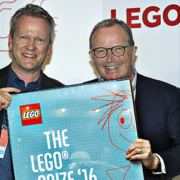2013 Grawemeyer Award in Education winner receives the LEGO prize 2016
Pasi Sahlberg, who earned the 2013 Grawemeyer Award in Education for outlining in the book “Finnish Lessons: What Can the World Learn from Educational Change in Finland?” his country’s approach to educational reform, has been awarded the LEGO prize 2016.
Former schoolteacher Pasi Sahlberg is the winner of the LEGO® Prize 2016. Finnish Sahlberg wins for his work to improve the quality of children’s education worldwide. The prize was presented at the LEGO Foundation’s annual LEGO Idea Conference in Denmark, which gathers academics, practitioners and representatives from educational organizations.
Former schoolteacher and current scholar and author, Finnish Pasi Sahlberg, wins the LEGO Prize 2016 for his work to improve the quality of children’s education worldwide. Hanne Rasmussen, CEO of the LEGO Foundation, presented the prize at the annual LEGO Idea Conference. The prize is accompanied by a cash award of USD 100,000 to support further development of quality in children’s learning.
The LEGO Foundation has taken on the ambition of re-defining what we mean with play and its role in learning, and of re-imagining how we best stimulate children to learn. This ambition is shared by Pasi Sahlberg, who believes that testing alone is the wrong way to quality education.
“Today, curiosity, creativity and ultimately genuine learning are at risk anywhere high-stakes testing, Big Data and punitive accountability are the dominant drivers of what teachers and students do in schools. This is a direct consequence of the current global education reform movement. Schools around the world have become places of standardized routines that aim at predetermined attainment targets in the name of improving competitiveness. Our children are therefore subjects of frequent assessments and tests that measure and divide them based solely on how they perform on these external expectations,” says Pasi Sahlberg.
Society needs creative and lifelong learners
These days, the LEGO Idea Conference hosts 300 academics, practitioners and representatives from educational organizations, who will discuss what quality learning is and how it can be put into action. According to Hanne Rasmussen, CEO of the LEGO Foundation, Pasi Sahlberg is a forerunner when it comes to improving the quality of children’s education worldwide.
“Pasi Sahlberg wins the LEGO Prize 2016 for his enormously dedicated work to improve the quality of children’s education globally. Pasi Sahlberg is a forerunner in the efforts to ensure quality in children’s learning, which he believes must build on the natural curiosity and collaboration between children. The LEGO Foundation shares this view. A child’s inherent ability to play is paramount in the early years and a catalyst for learning competencies that prepare the child for formal education, creativity and learning. Quality learning supports a respect for children’s playfulness and does not only focus on curriculum that mirrors later educational experiences.,” says Hanne Rasmussen.
About the LEGO Foundation
The LEGO Foundation believes that learning through play is essential in children’s learning and development. The LEGO Foundation has taken on the task of re-defining what we mean with play and its role in learning, and of re-imagining how we can stimulate children to learn. Skills like problem solving, creativity, empathy, communication and teamwork are all rooted in play, which involves a constant process of “try, fail and try again” – helping children to develop and fine-tune the creative and critical thinking skills.
The mission of the LEGO Foundation is to inspire and develop the builders of tomorrow. The aim is to build a future where learning through play empowers children to become creative, engaged lifelong learners.
The LEGO Foundation focuses on children aged 0-12 with a special emphasis on early childhood. This is the period when children develop most rapidly and when play is instrumental in building skills essential for the rest of their lives. As documented by several studies, investing in early childhood provides exceptional returns for the individual child and for the society, as it will lead to less crime, higher high school graduation rates and higher incomes.
About Pasi Sahlberg
Pasi Sahlberg is an award-winning scholar and author. Sahlberg has previously worked as a schoolteacher, researcher and policy adviser in his home country Finland. Currently Sahlberg is a visiting professor at Harvard University and has served the World Bank, European Commission and OECD to improve education around the world. Sahlberg is working to improve the quality of children’s learning, which he believes should be based on learning through play and children’s natural curiosity.


